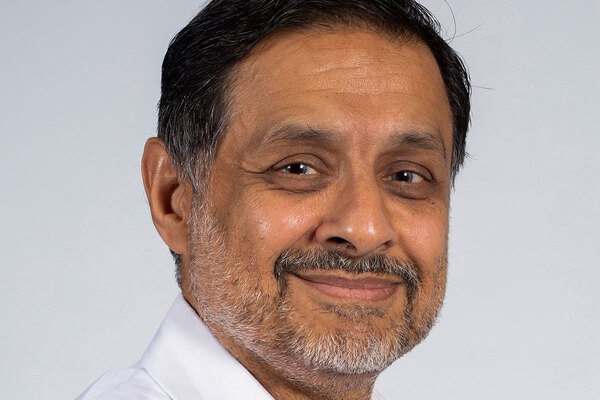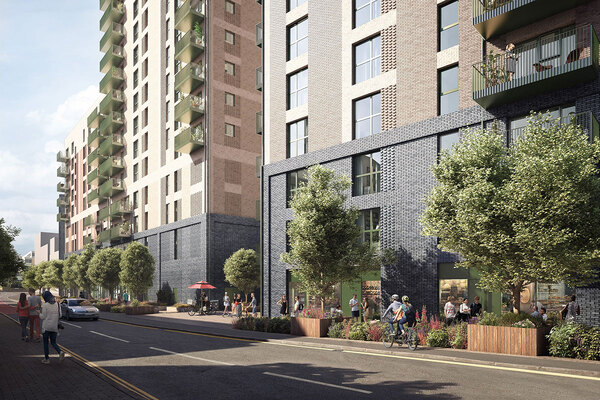You are viewing 1 of your 1 free articles
A match made in heaven?
A new breed of ‘social impact’ investors are wooing housing associations. But shortly after one venture by private equity giant Octopus was disbanded, Nick Johnstone investigates if this really is an ideal partnership
Private money is circling the affordable housing sector like never before. This new breed of investment fund – Cheyne Capital, Funding Affordable Homes (FAH), and newly listed Civitas Social Housing, to name the three most prominent – come armed with bulging wallets and big ideas.
Each of them makes an attractive claim: that ‘social impact’ and private equity-style investments are not nearly as mutually exclusive as they sound. With billions to spend overall, they talk about patient capital, aligning vested interests with the public interest, and ethical equity taking the place of scarce government grant.
But one question springs to mind: is this all just words?
Last month it was reported that, just 18 months after its launch, one such venture – set up by £5bn private equity giant Octopus – had been disbanded without building a single home. Octopus was surprisingly candid about it, admitting that the anticipated pipeline of opportunities had simply not emerged.
Octopus’ rivals contest that their business models are more compatible with social housing and ethical goals. What can sound like PR bluster, however, prompts genuine concern that housing associations could be lulled into unfavourable long-term transactions, akin to the sale and leaseback deals that sank care home operator Southern Cross in 2011. So, how to separate action from rhetoric?
Multiple meanings
Impact investment is a nebulous, subjective concept. All organisations have their own way of measuring how different stakeholders have benefited from their deeds, with differing priorities for each: financial returns, social returns, environmental returns, or all three running in parallel – what Igloo chief executive Chris Brown, a self-proclaimed “responsible investor”, calls “the so-called triple bottom line”.
Definitions of what constitutes social investment are varied. Purists point to a ‘theory of change’: the idea that something ‘good’ has to happen that wouldn’t otherwise have been achieved without the investment. Others argue that the investment must have an element of philanthropy to it. This could involve the investor taking a lower return or higher risk in order to achieve a certain social change, irrespective of the potential dent on profits.
Under this definition, Big Society Capital might be the only genuine impact investor in affordable housing. Set up by the government in 2012, it has £600m (mostly drawn from dormant personal bank accounts) to spend on “enabling other bodies to give financial or other support to third-sector organisations”.
“You can spend a lot of money on social housing and not build any houses.”
Tom Bennett, investment director, Big Society Capital
It sacrifices profit – covering only its costs and retaining the value of the pot over inflation – for social returns. Income is recycled into fresh socially conscious initiatives. It describes itself as an independent financial institution with a social mission.
Tom Bennett, investment director at Big Society Capital, says impact investment falls somewhere between straight-up government grant and private finance. In housing, he says, the social returns are very specific: “You can spend a lot of money on social housing and not build any houses. We focus on additionality.”
Big Society Capital has two £15m investments in affordable housing funds that are closer to frontline delivery – Cheyne Capital’s Social Property Impact Fund and FAH. These two investments – from an organisation solely dedicated to impact investment – are an endorsement of both funds’ strategies. Indeed, it’s fair to say that social impact is embedded within both their investment strategies.
The £50m FAH fund was originally set up by merchant bank Salamanca to deliver impact investment in the sector. Salamanca has since stepped back while FAH has received investment from the Joseph Rowntree Foundation, alongside Big Society Capital.
Paul Munday, chief executive of SHA Housing, which runs the fund, says Big Society Capital invested partly because it was impressed by the calibre of the board members but also because it wanted to exert some influence over the type of investments carried out.
SHA Housing carries out detailed due diligence using a social performance assessment framework, devised in conjunction with social impact advisor The Good Economy Partnership. These reports, scored up to 500, assess criteria including affordability, additionality, social need and tenant engagement. FAH owns the real estate and offers returns of 4-4.5%, underpinned by the capital appreciation of the assets. FAH’s first investment, in a YMCA building in Luton, scored 460 out of 500.
Sarah Forster, chief executive of The Good Economy Partnership and former deputy chief executive at Big Issue Invest, says: “We’re only interested in funds and management teams where the investment is not focused on maximising profit, so most [yields] are in the single digits. Our role is as social advisor.”
Civitas Social Housing is a slightly different beast from Cheyne and FAH – not least because it is listed on the London Stock Exchange. It is a real estate investment trust (REIT) with the sole purpose of investing in social housing. Investor marketing materials from last November talked about the long-term, quasi-government-backed income on offer, from leases to registered providers of 10 to 50 years in length, providing investors with yields in excess of 5%.
Those marketing materials mention social impact twice, claiming fresh equity into the sector would enable the building of more affordable homes. However, when Inside Housing asks for more information about what “social impact” meant, Civitas is unable to explain more. The company instead produces a press statement explaining that it will be reporting on social impact alongside its company results.
“We’re only interested in funds and management teams where the investment is not focused on maximising profit.”
Sarah Forster, chief executive, The Good Economy Partnership
Like Cheyne and FAH, Civitas has social impact checks in place prior to starting due diligence, but says it is unable to provide more detail about them until it has passed the information on to investors. However it has completed £80m of transactions, including a £9.1m acquisition with an initial net yield of 6%, comprising the freehold or long leasehold interest in 20 supported living properties in the North East, North West, South West, Wales and London.
It says it is too soon to judge these deals. “Although it is too early to assess the social impact of these investments, what can be said at this point is that Civitas Social Housing has secured the future of the homes of hundreds of people – many of whom have support needs and live in specialist accommodation.”
In a statement sent to Inside Housing, Michael Wrobel, chair of Civitas, says: “For [Civitas], generating positive social impact from our investments is as important to us as it is to our partner housing providers. In our view successful investment in the sector should provide a fair return to our shareholders and discernible benefit for the people who live in the properties that we own. To this end, we are incorporating a social impact evaluation within the regular monitoring of our investments.”
Civitas’ biggest ‘partner provider’ thus far is Westmoreland Supported Housing Association. When questioned about whether entering into long-term lease agreements (25 years on average) with a listed entity which aims for a 5-6% index-linked yield was a good deal, director Bill Glynn says the housing association did explore traditional corporate lending. It concluded that signing the leases was favourable because they included break clauses, while voids were covered by the care provider.
Piers Williamson, chief executive of bond arranger The Housing Finance Corporation, is less convinced of the merits of Civitas versus traditional debt. “They’re flogging long-term index-linked social housing at a high cost of funds, offering a 5% return,” he says.
“The worrying thing about the long-term impact, with things like extra care, is the continuity of government funding. If the funding stream falls out of the window in two years’ time, it’s the housing association that has to pay. The housing association is delivering the social good. The investors would say they are, but they’re getting their pound of flesh. And aren’t [housing associations] paying more for the funds than they would otherwise?”
And there’s the rub. In a sector with the greater good at its core, is it really possible to scale this up and marry private finance with affordable housing and deliver, among other things, additionality?
Ethical capitalism
Like SHA Housing, Cheyne Capital also has a social advisor in the form of New Philanthropy Capital. It sits on the fund’s board and writes an independent assessment – not under the influence of Cheyne – before deals are put before the investment committee. Shamez Alibhai, partner at Cheyne Capital, says an equal amount of social and financial paperwork is put in front of the committee. Prior to due diligence, investments are ‘screened’ under such criteria as social mission, beneficiaries and a socially conscious exit strategy.
Mr Alibhai talks about the “intentionality” of deals. Cheyne recently bought a 338-unit portfolio of residential properties in Croydon, worth £51.8m, from an overseas investor. All three buildings are office-to-residential conversions, let to the London Borough of Croydon. The deal looks crude on the face of it – a straightforward lease to a council. So how is this different from any other real estate transaction? Is Cheyne not just buying a lease? For one, it is understood that Cheyne will be regearing the lease for the long term and reducing the rent, with an agreement it is still negotiating with the borough.
“We are incorporating a social impact evaluation within the regular monitoring of our investments.”
Michael Wrobel, chair, Civitas
Mr Alibhai says: “I think there’s a falsehood with the social sector and the private that ‘never the twain shall meet’.” He says offering equity instead of debt allows the private sector to step in where government grant has stepped away. “You can’t grow the world with debt,” he says, making the case for long-term leases over, for example, bonds, which only bring in debt finance.
In social housing, currently these kinds of impact investment are largely the preserve of high net worth individuals and institutions. From a cynical perspective, pension funds want to be invested because of the reputational advantages associated. Ethical capitalism is à la mode.
Ms Forster believes these kinds of impact investments could go mainstream and be scaled up in a big way. “There’s this huge economic surplus in the City of London: we need to reconnect that capital with communities,” she explains. But she admits that there can be a degree of “social wash” (where false claims are made about social impact) and that impact investment can be “hyped up,” while some in the City think of it as simply “making money from the poor”.
Greg Campbell, partner at Campbell Tickell, who is on the board of SHA Housing and was involved in setting up Civitas, says that realistically, financial transactions like these need to deliver returns.
“It’s not charitable. However, there are a number of people who want to see their money put to good use in a way that has a social purpose, provided it meets the financial requirements. It will fit into some people’s definition of corporate social responsibility. It ticks both boxes,” he says.
In its marketing materials, Civitas is trying to pull off a highwire act: simultaneously reassuring investors and demonstrating its social value. It makes it clear that no housing association has defaulted on a loan (“no funder in the sector has ever suffered a credit loss”). It also consistently puts a distance between its activities and other sale and leaseback deals that have gone wrong. For the social housing sector, on the other side of the ledger, it is encouraging that the company has agreed to measure its social impact, as part of its financial reporting.
It’s a sign that the private sector players who are dipping their toes into social and affordable housing are willing to be judged on their actions, not just their words.
UPDATE: At 5.10pm on 20.3.2017
This article was updated to state that Civitas conducts social impact checks prior to starting due diligence, after Civitas indicated it wanted to make its position clearer following interpretation of a question asked by Inside Housing.









